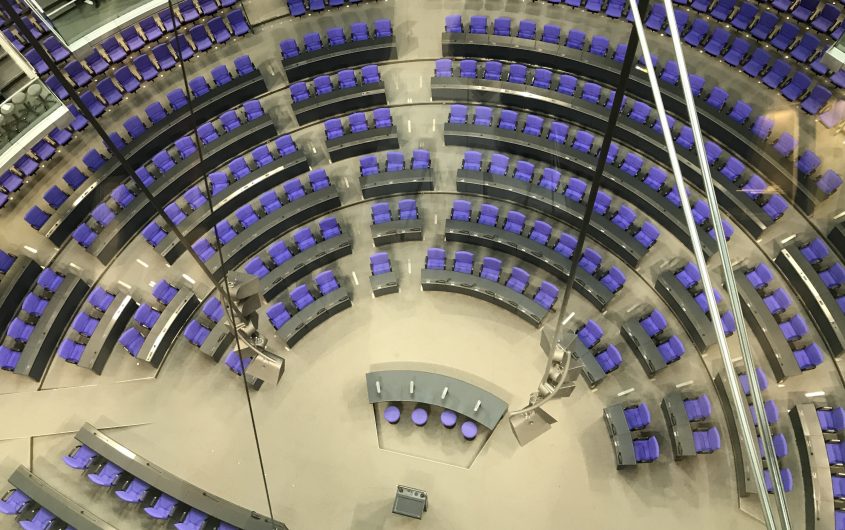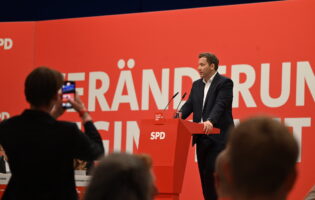
David McKelvey via Flickr
A Question of Dissent in the German Government

Florian Bastick
University of Hamburg
Florian Bastick recently commenced his master's degree in Politics, Economics, and Philosophy at the University of Hamburg. Prior to this, he studied Political Science at Leibniz University Hanover and worked as a student assistant at the Chair for Comparative Politics. He completed an internship at the Institute for Parliamentary Research (IParl), an institution of the Foundation for Science and Democracy (Stiftung Wissenschaft und Demokratie). His research interests encompass parliamentarian party politics, elections, and political economy.

Franziska Carstensen
Institute for Parliamentary Research
Dr. Franziska Carstensen works as research associate at the Institute for Parliamentary Research (IParl) in Berlin. She is also an adjunct lecturer at the Berlin School of Economics and Law. Her research and teaching areas include the German political system, parliaments at all levels (in particular at the sub-national state level), and federalism. Currently, she works in a research project on second chambers (senates) in comparison, and she examines German state legislatures and their parliamentary functions.
Since the last federal elections in 2021, Germany has been governed by a so-called Ampelkoalition (traffic-light coalition), named after the political colors of its parties: red for the Social Democrats (SPD), yellow for the Liberal Democrats (FDP), and green for the Greens. With three very different parties in government and the first coalition of its kind at the federal level, the stability of such a government cannot be taken for granted. As Chancellor Olaf Scholz’s government ends its second summer recess after two years in office, many political commentators are evaluating this new coalition. Formed in 2021 as a self-proclaimed progressive coalition, divisions between the governing parties have since then emerged.
One of the most recent triggers for dissent was the debate on a new heating law, which aimed to phase out gas heating. This ended in a public dispute, in particular between the Liberals and the Greens. In addition to the high potential for conflict in climate policies, the past year was also dominated by the response to both Russia’s invasion of Ukraine and the discussion about mandatory vaccination against COVID-19 at the start of 2022, the latter strongly opposed by the Liberals.
These ongoing discussions have sparked a debate on how divided the government actually is. While most of the media have argued for months that the coalition is deeply divided on fundamental issues, the public also appears to be doubting its stability. According to a recent survey by the public broadcasting service ZDF, 74 percent of respondents described the relationship between the governing parties as poor. The Greens and the Liberals are seen as the main culprits, whereas 28 percent of respondents blame all parties, including the Social Democrats. It is also disputed whether this level of disagreement between coalition partners is somewhat normal or indeed exceptional.
Dissension can be challenging to grasp. However, it could be assumed that a general atmosphere of mistrust between coalition partners would be expressed, amongst other things, through parliamentary questions. Parliamentarians could indeed use them to attack coalition partners by challenging their initiatives directly. In the case of a united government, it can be expected that governing parties do not expose each other by attacking or questioning each other’s ministers and secretaries using parliamentary instruments. In the case of a disunited government, however, one can expect that deputies of governing parties expose ministers of a coalition partner more openly by using, for example, parliamentary questions.
According to a recent survey by the public broadcasting service ZDF, 74 percent of respondents described the relationship between the governing parties as poor.
Simple written questions are a tool mostly but not exclusively used by deputies of opposition parties in the German Bundestag; other question rights are also almost always expended only by opposition parties and their deputies. In contrast to the two other written question formats, i.e., the so-called small and grand questions (Kleine and Grosse Anfragen), simple written questions can be asked by individual parliamentarians and are not reserved for parliamentary parties. This gives individual deputies more freedom in asking such questions. Small and grand questions, on the other hand, are at the disposal of parliamentary parties and their leaders. It is, therefore, very uncommon that small and grand questions are used by government parties since their leaders will try to avoid any open questioning of a government they collectively support—and indeed between 1990 and 2021, almost one hundred percent of those questions were used by opposition parties. So, if there is dissent amongst government deputies, it is most likely expressed in simple written questions.
In general, every deputy is allowed to ask four such written questions per month. The government, i.e., the respective ministry, must answer within a week. In recent electoral terms, most written questions were submitted, as can be expected, by opposition deputies: The proportion varied between almost 97 percent (2017 to 2021) and almost 78 percent (2005 to 2009).
So far (and at the mid-term of the legislature), about 10,000 written questions have been submitted to the traffic-light coalition ministries. This is similar to the frequency of written questions in the last term, which amounted after four years to about 25,000. Five percent of those 10,000 written questions have come from government deputies. This is, compared to other electoral terms, not unusual. So, just looking at the sheer number does not reveal a higher potential for conflict between the three coalition partners than coalitions of two partners, which had been in government in Germany before.
While intra-government division is clearly visible in questions on domestic issues, it is almost non-existent on foreign affairs.
However, deputies of the three government parties use written questions quite differently: parliamentarians from the Social Democrats have rather seldom used that tool with around 0.4 percent of the questions whereas Green and Liberal deputies have been much more active (4.6 percent for both parties combined). The latter two direct their questions so far to different ministries: the Greens have asked most often the ministers for transport (FDP), home affairs (SPD), and finance (FDP) whereas the Liberals direct most questions to the minister for health (SPD). This could be in particular due to the critical stance the FDP took towards the management of the pandemic. FDP deputies also directed a lot of questions towards the ministries for the economy and climate as well as for family affairs (both held by the Green party). So, Green and Liberal deputies focus their questions on ministers held by coalition partners by using written questions. However, they also question ministries held by their own party—but to a lesser extent. The FDP deputies, for example, put only 14 percent of their questions to FDP ministries. All three parties directed the least number of questions towards their own ministries.
Differences also emerge when taking into account keywords attached to written questions. Here, we see, first of all, that the current opposition parties of Christian Democrats (CDU/CSU) as well as of the far-left and far-right parties (Die Linke and AfD) use written questions for a wide range of topics, including foreign issues like the war in Ukraine. In contrast, deputies from the governing parties have, so far, clearly focused on home affairs. Corresponding with the ministries the Liberals have asked most frequently, the top keywords mentioned in their written questions are: COVID-19, vaccination, and heating systems. For the Greens, roads, railways, and transport issues are among the keywords most often mentioned. In contrast, there are no clear preferences for Social Democratic deputies detectable—a rather wide range of keywords might be reasoned by particular personal interests of individual deputies but without strategically targeting ministries or topics relevant to coalition partners.
What can we draw from this? First of all, deputies from the current coalition parties do not ask more written questions than government deputies in previous terms. However, analyzing those questions helps to (a) redraw the lines of debate within the current government and (b) to spot which issues are likely to cause conflict between which parties. Secondly, most conflicts between coalition partners that are expressed in written questions arise between the Greens and the Liberals. The Social Democrats, in contrast to the other two, are quiet when it comes to asking parliamentary questions. This is in line with the general impression both the public and the media have of the state of the government. While intra-government division is clearly visible in questions on domestic issues, it is almost non-existent on foreign affairs. Deputies from opposition parties ask, however, more questions on foreign policy issues. Taking into account that we only looked at one parliamentary instrument, our results show nonetheless that there is not a higher level of conflict between parties of the current traffic-light coalition than between partners of previous governments.









